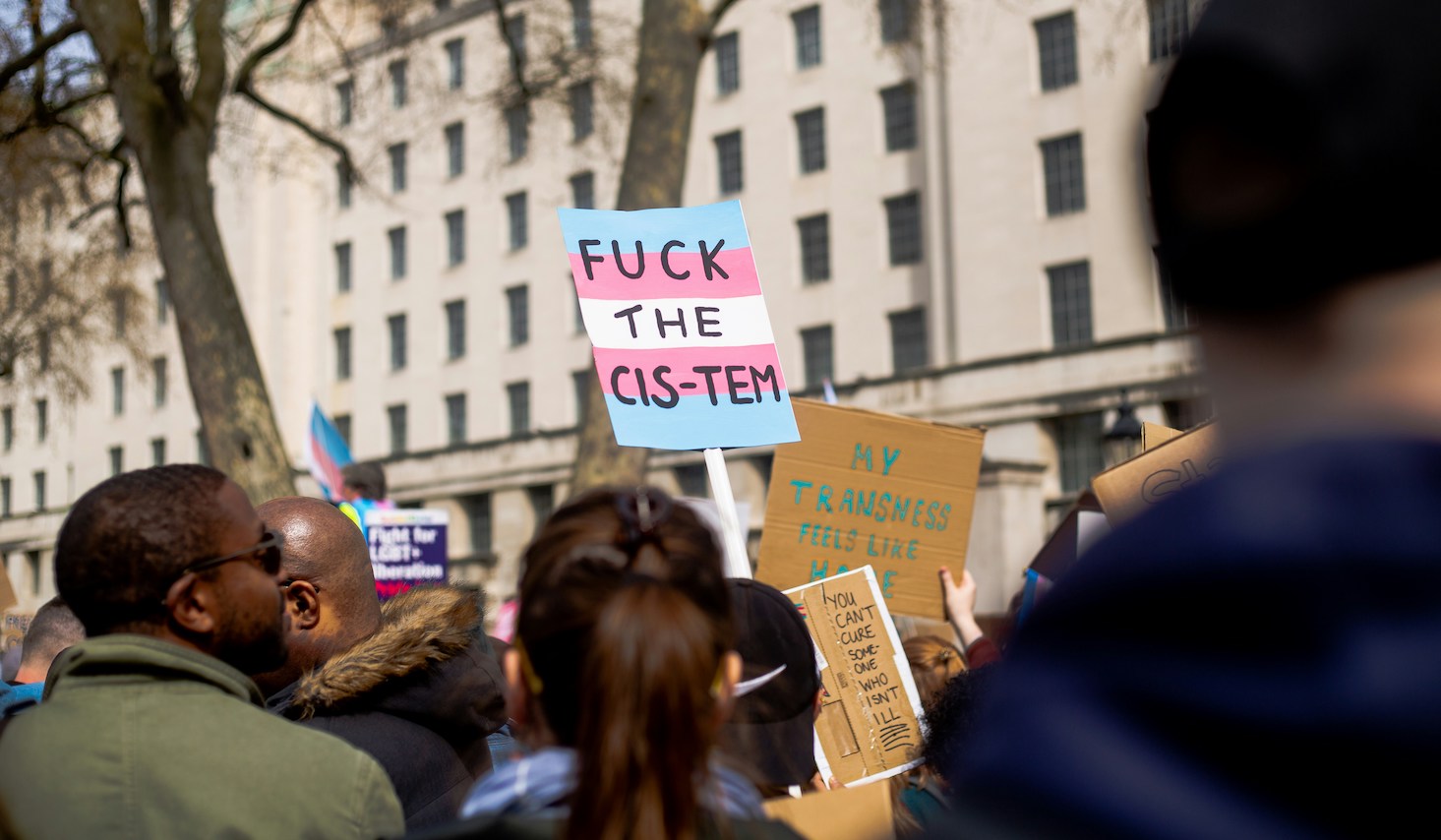
TW: transphobia, transphobic terms used when quoting official documents.
On 15 April, in a devastating blow to trans rights, the UK Supreme Court ruled that the legal definition of a woman is based on biological sex alone.
We are already seeing the negative effects come into play: last night, the EHRC (the Equalities and Human Rights Commission) issued disappointing interim guidance on how organisations should interpret the Supreme Court ruling.
The guidance states that, in workplaces and services open to the public, trans women should not be allowed to use women’s toilets and trans men should not be allowed to use men’s toilets. It also adds that, in some cases, trans women can be blocked from men’s toilets and trans men from women’s toilets.
While advocating for the exclusion of trans people from all single-sex toilets, the guidance states that “where possible” mixed-sex toilets, washing or changing facilities should be available in addition to single-sex facilities.
The guidance also ignores – or, more accurately, wilfully undermines – the fact that trans men can be bi or gay and trans women can be bi or lesbians.
It advocates for the exclusion of trans people from gay and lesbian spaces, stating that, for associations of 25 or more people: “A women-only or lesbian-only association should not admit trans women (biological men), and a men-only or gay men-only association should not admit trans men (biological women).”
At a school level, it states: “Pupils who identify as trans girls (biological boys) should not be permitted to use the girls’ toilet or changing facilities, and pupils who identify as trans boys (biological girls) should not be permitted to use the boys’ toilet or changing facilities. Suitable alternative provisions may be required.”
View this post on Instagram
The context
The Supreme Court’s decision dictates how the 2010 Equality Act – which aims to prevent discrimination based on a number of protected characteristics, including sex – will be interpreted across Britain.
The ruling was the culmination of a legal battle brought by For Women Scotland – a gender critical group which received a £70,000 donation from JK Rowling to help challenge the Scottish government’s assertion that any woman with a Gender Recognition Certificate is entitled to the same sex-based protections as women assigned female at birth.
Understandably, the past week has been greatly disheartening and upsetting to trans women – and the wider trans and queer community – as the Supreme Court has opened the door to excluding trans people from single-sex spaces and undermining trans agency and dignity.
What can be done about it?
We’re unequivocally of the belief that the UK Supreme Court’s ruling – and the EHRC’s subsequent interpretation and guidance – are grievous attacks on the trans community’s right to simply exist in public.
The queer community and allies must come together to challenge this – here are some things that can be done.
Donate:
Currently, The Good Law Project is fundraising to challenge the Supreme Court’s judgement, arguing that it has placed the UK in breach of its obligations under the Human Rights Act. You can donate here.
If you have the means, direct your money and resources to the trans community: connect trans people to paid opportunities, donate to trans-led organisations and contribute to trans people’s fundraisers for gender-confirming care.
Agitate:
Write to your MP! Write to the Prime Minister! Show up to a rally!
If you’re unsure of how to go about writing to an elected official, the charity Trans Actual has helpful advice on how to write to Kier Starmer, your MP, or the Equalities Minister.
Whether or not you identify as trans, you can also show up to Trans Pride marches in solidarity – come out for the trans community whenever you can.
View this post on Instagram
Participate:
When it comes to directly addressing trans bathroom access, community solutions are already emerging.
P Eldridge, Fi Kube and Caitlin McLoughlin, via SISSY ANARCHY, have just launched the Trans Bathroom Access Sticker and a plan for trans bathroom inclusion.
“We launched this initiative to mitigate the effects of oncoming laws on trans people’s access to public life, which will be severely impacted, particularly as it pertains to access to public bathrooms. Trans people deserve the dignity and respect to leave the home knowing they can access a bathroom, or other spaces where gender is regulated, with simplicity, ease and safety,” say Eldridge and Kube.
The plan encourages workers, trans people and allies, to propose the following to employers:
1) Allow all trans people to access the business’s bathroom; whether they are customers or not.
2) Display a vinyl window sticker that declares your bathrooms are safe, accessible spaces for trans people.
Community solutions like the Trans Bathroom Access Sticker allow individuals to make positive changes to support trans people – and encourage businesses to send a message of solidarity.
“We need businesses to become advocates for the safety of trans people because right now, across the UK and beyond, trans people are facing unprecedented political attacks. We ask businesses to purchase the sticker and feature it on the facade of their business, showing they are a safe place for trans people to use their facilities, whether they are customers or not,” add Eldridge and Kube.
“This small act sends a BIG message: You see trans people. You support trans people. You are a safe space for trans people to use basic facilities.”
For further info, and to buy the Trans Bathroom Access Sticker, click here.